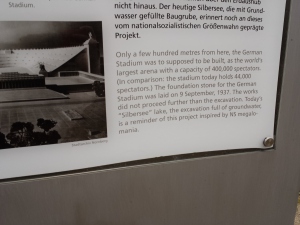As a cautionary note, please be aware that this is a fairly rambley, stream-of-thought, my-internal-monologue style of thought
As I sit and write my Thesis, I am constantly having to backtrack and rethink what I am doing. This reexamination is not a result of my arguably (read: “definitely”) terrible lack of ability to spell, nor is it particularly a result of any primal urge to proof-read. Instead, I am regularly uncertain as to what my position is on the whole matter of “culture”, in which my current project deals heavily. The chapter I am currently writing seeks to examine the concept of culture within a National Socialist context. Perhaps it would be best to frame this thought within the greater work of my project.
My Thesis work looks to examine the relationship between time and cultural (for my purposes, “history”) and state-sponsored architectural works within the National Socialist regime. Specifically I want to suggest that the building projects of the National Socialists reflect their unique relationship to historical consciousness. My project covers three aspects of this relationship: the aesthetics of the early to mid 1900s, the National Socialists’ understanding of time, and the conceptions of culture then and now. Currently I am working on the latter of these points.
Back to my consternation. The primary issue I am currently having is wrangling with the concept of culture as a unique and definable thing. For my project I would like to put forth the idea that the ways in which the National Socialists understood themselves as existing within a specific historical ideal and expressed this idea through their architectural works denotes them as the holders of a very specific and uniquely National Socialist culture. I will have an entire chapter dedicated to arguing that the aesthetics of their architecture reinforce this argument (of which I am fairly confident in myself), as well as a chapter on the perceptions of time (which requires the completion of this thought to proceed). Where I am at odds is on the point of a “unique culture”. My problem here is that I myself, as an historian and a thinking assemblage of skin-and-fat, have a very (read: “VERY”) hard time believing that the term “culture” really implies anything worthy of its own word. My feelings on this subject, I have found, are exceedingly hard for me to communicate, particularly with anything beyond wild hand-gestures, grunts, and chirrups. This being said, I’m going to take a risk and try anyway.
I should preface this part of the discussion by first noting that I am coming at this from a very specific background: I am white, identify as a heterosexual male, and am from the higher-end of the lower-class of a western country. I am a university-educated history major who studies an extremely specific historical period (I pretty much exclusively study overtly depressing historical topics). In addition to this, I am also currently attempting to derive my thoughts from my own understandings, avoiding simple regurgitation of the ideas of other, more established thinkers. My reasoning for this is to establish a more raw base from which to examine my own thoughts before digging right into self-dissection. So when I approach this subject, I am at least acutely aware of where my thoughts are coming from.
I have a difficult time accepting the term “culture” as having any real meaning anymore. While I would like to be able to apply it as a label for the combination of sentiments and ideas that the group of people I am studying more-or-less have a consensus about, I find it increasingly difficult to detach the word from its inherently catch-all nature. I have heard the term culture applied to national, ethnic, religious, athletic, social, academic, virtual, distant, and recreational groups. Each time it appears to me to be a simple placeholder for “set of ideas and thoughts that some of these people accept or at least acknowledge as being accepted by others in the group.” Before we get to uppity about “but yes, that is how words work”, I understand that it is, by its nature as a word, a placeholder for an idea. Where I take issue is with the seeming lack of acknowledgment of this in the general use of the word. If we accept, let’s say, that Canadian culture is a thing that is real[1] then I as a Canadian citizen, as a person living in Canada, as someone whose family has lived in Canada for a period of time, should fall under the sway of “Canadian” culture. But what does this mean? To me, “Canadian” culture has such a varied and contradictory assortment of identifiers that it is exceedingly difficult to pin-point what constitutes a coherent narrative of “Canadian” culture. Is it what we see on the Heritage Minutes? What beer commercials promote? Our (apparently) unanimous love of hockey, Timmies, and all things reminiscent of Strange Brew? I’d like to note that the point I am trying to make here is not to lambaste Canadiana[2] but instead to point out the exclusive nature of identifying groups by the things that unite them, specifically when those things are not shared across the entire community they purport to represent.
Continuing this experiment wherein Canadian culture exists as depicted in commercials and stereotypes, can I be part of Canadian culture if I do not like hockey? What about those who like hockey, affordable coffee, and Rick Moranis, but are not from Canada, nor do they reside here? Arguably culture cannot be dictated by geography as this would leave the lingering question of diaspora culture. The scope of the word lends itself to abuse, allowing for such a malleable and all-inclusive definition as to render the word meaningless. There are, perhaps, more appropriate words out there to signify the idea that I have for culture. It has been suggested to me that “community” is perhaps a better label. My understanding of “community” is even less informed than that of culture. To remedy this, I have retrieved two of the versions of the Dictionary of Anthropology that I could get at my school’s library. what follows are the definitions for culture and community from each text.
- The Anthropological Glossary[3]
- Culture: “that complex whole which includes knowledge, belief, art, morals, law, custom, and any other capabilities acquired by man as a member of society.”
- Community: “a social group or area in which competition and other interpersonal relations exist; the smallest unit of society capable of independent existence.”
- Dictionary of Anthropology[4]
- Culture: “All that which is nonbiological and socially transmitted in a society, including artistic, social, ideological, and religious patterns of behavior, and the techniques for mastering the environment. The term culture is often used to indicate a social grouping that is smaller than a civilization but larger than an industry.”
- Community: “Mutually dependent families living and working together in a given area and usually in face-to-face association.”
It would appear that where anthropology is concerned, community is largely a geographic concept, relating to the closeness of relationships. Now, arguably these definitions are dated (the books are from 50s and 80s) and do not take into account the pervasiveness of the internet and the ways in which it bridges geographical divides. This being said, I am still unsatisfied with the definition of community as I am more interested, not in the division of people into cultures or communities, but in the concept of culture as a thing which one can have, or be part of. If one can have “community”, I do not believe that it would be the appropriate word to define the concept I am dealing with.
The definitions of culture found in these texts also suffer from the focus on division of people rather than that which defines people (in addition to being pretty antiquated in their definitions). If you would permit me to jump around a bit here, I would like to propose another of my thoughts on the inherent meaning of culture. Remembering our scenario of a specific Canadian culture, we can argue that culture (if this is a facsimile of a “real” culture) is exclusive by-nature. The terms by which culture dictates inclusivity are inherently a response to what members dictate or perceive as that which lies outside of the group. I may not like hockey, but I like Rick Moranis and doughnuts so hey, I’m close enough. This act of acceptance (I find) belies a deeper reliance on the othering of those not deemed appropriate in their actions or beliefs to be part of the culture. When the terms of what constitutes “culture” are expanded to be more inclusive and avoid the issue of inclusive/exclusive it generally expands to such a state as to remove any meaning to the word.
I have found, in my studies and general milling about places, that the ways in which most people I interact with perceive culture through a fairly optimistic/positivist[5] lens, which lends itself to the inclusive understanding of culture that has a meaning and is important. The argument often devolves into a glass-half-full/empty scenario which tends to result in a lot of “well I guess everyone is right.” This is always an interesting conversation and generally helps me to work though my own ideas (which very often lean toward the more pessimistic understanding of things). Unfortunately, this is a problematic issue to have when attempting to argue a point that has two equal sides, but on which you fall pretty exclusively to one side. As I had mentioned above, I generally study some of the more morose historical topics. I say this, but realistically I should add the qualifier more overtly morose historical topics, as the vast summation of human history is pretty violent and awful, but generally we tend to avoid discussing that when we can.[6]
Well i am out of time for today, so perhaps I will wrap-up this post with a few summarizing questions which I am currently thinking about, and for which I have decided to ramble these past few paragraphs.
What is “culture” in the sense of a way of describing people? More specifically, is there such a thing as Canadian/American/German/French/Nazi/Liberal/Kayaking culture? If so, how is it defined? Is culture a definable idea? Bearing in-mind that this is an expression of one of my rough thoughts, is there something I am completely missing in my rambles above?
I’d love to hear your thoughts, please leave a comment. I don’t think I will answer questions or respond to comments directly, but I will most definitely take things into consideration as I continue to work through this thought.
Thanks for reading,
– Alex
————————
1 – the existence of “real” is best left for another discussion.
2 – Strange Brew is a great movie!
3 – Pearson, Roger. Anthropological Glossary. Original ed. Malabar, Fla.: R.E. Krieger Pub., 1985. 54, 60.
4 – Winick, Charles. Dictionary of Anthropology. New York: Philosophical Library, 1956. 126, 144.
5 – I’m fairly certain I am conflating my ideas here. What I mean by this is a sense that things are a certain way, which is what has been said publicly, or is generally understood by most people, and which actively but not overtly attempts to promote a positive and upbeat interpretation of events while avoiding any discussion that the entire framework of understanding being used may depend on a rather grim or horrific principle.
6 – Read: “I am a pessimist”
————————–
I claim no rights to the cover image, which is from: https://www.flickr.com/photos/25832722@N08/3047856032/


